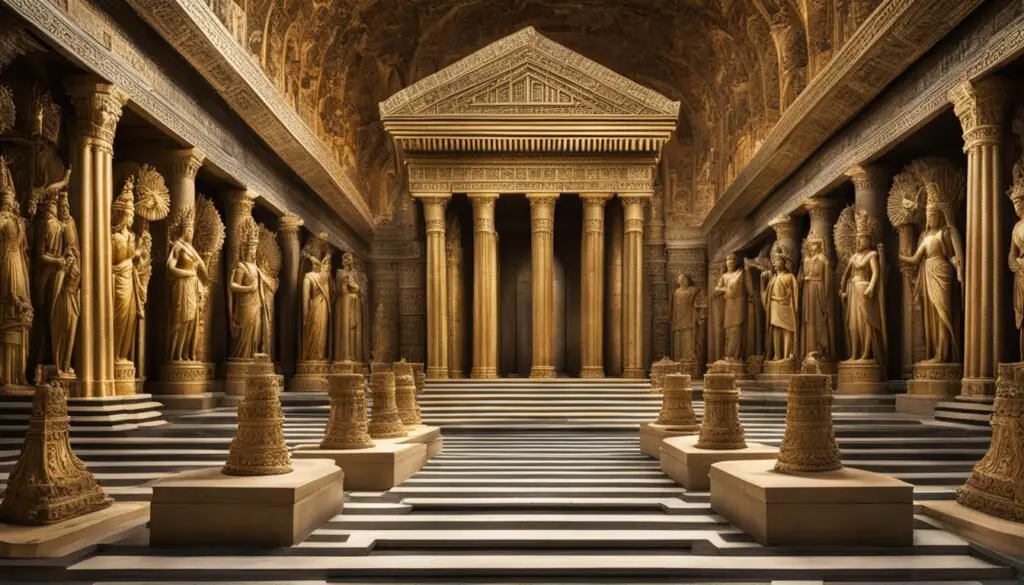Welcome to our exploration of Greek mythology, where we delve into the fascinating world of gods and goddesses from ancient Greece. From the pantheon of Greek gods to the myths and legends that surrounded them, we’ll uncover the rich tapestry of Greek folklore and its enduring impact on society.
So, how many gods are there in Greek mythology? Let’s embark on this journey together and discover the answer.
Join us as we delve into the pantheon of Greek gods, explore their origins, roles, and attributes, and uncover the significance of Mount Olympus, their celestial abode. We’ll also examine the worship of these deities in ancient Greece and their representation in art, unraveling the visual language that brought these gods to life.
Our exploration will not only shed light on the gods themselves but also on their influence on Greek society, shaping cultural ideals, values, and even the moral beliefs of the ancient Greeks. Through this journey, we hope to deepen our understanding of the gods of ancient Greece and their enduring legacy.
Key Takeaways:
- Greek mythology is filled with a pantheon of gods and goddesses from ancient Greece.
- The twelve Olympian gods held prominent roles in Greek religion and culture.
- The origins of the Greek gods trace back to the primordial gods and the Titans.
- Mount Olympus was believed to be the dwelling place of the gods.
- The worship of the gods involved rituals, offerings, and religious festivals.
The Origins of Greek Gods in Mythology
In Greek mythology, the gods of the Greek pantheon have fascinating origins that are deeply rooted in myth and legend. These ancient deities were believed to have emerged from the primordial gods, who personified the fundamental forces and components of the cosmos. The Primordial Gods, such as Chaos, Gaia, and Erebus, laid the foundation for the subsequent generations of gods.
From the Primordial Gods, the Titans were born. The Titans were a powerful race of deities who ruled over the cosmos before the Olympian gods. They were the children of Gaia and Uranus and were known for their immense strength and authority. The Titans, in turn, gave birth to the Olympian gods, who ascended to power after a great war known as the Titanomachy.
The Olympian gods, including Zeus, Hera, Poseidon, Athena, and others, became the most prominent deities in Greek mythology. Each god had a specific domain and played a significant role in Greek culture and religion. They were revered and worshipped by the ancient Greeks, and their stories and legends continue to captivate us today.
Origins of Greek Gods in Brief:
- The Primordial Gods personified the fundamental forces and components of the cosmos.
- The Titans were the children of Gaia and Uranus and ruled over the cosmos before the Olympian gods.
- The Olympian gods, born from the Titans, became the most important deities in Greek mythology.
- Each god had a distinct domain and played a significant role in Greek culture and religion.
The Twelve Olympian Gods
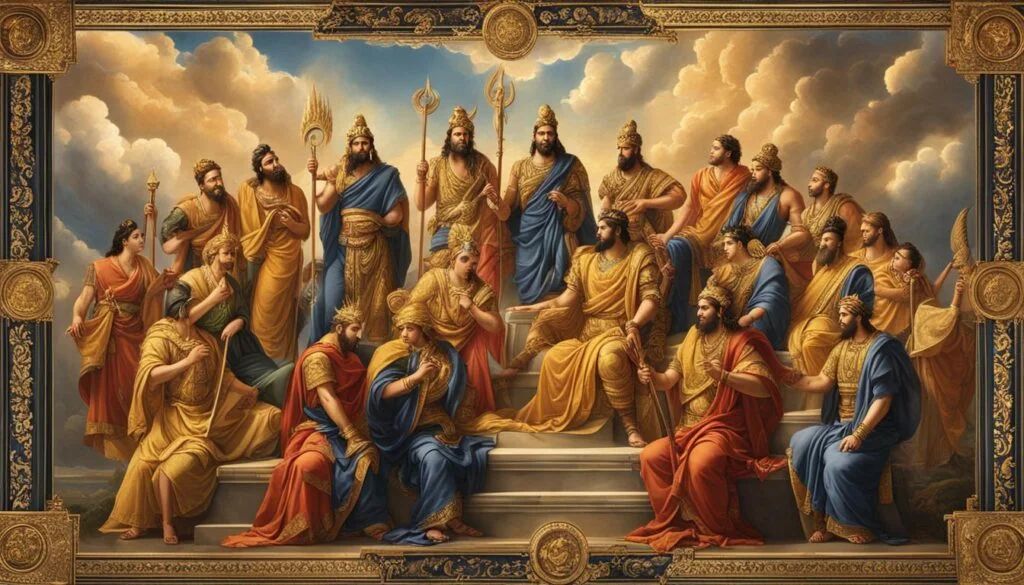
The twelve Olympian gods held a significant place in Greek mythology and were considered the most important deities in the pantheon. Each god had a specific domain and played a major role in Greek religion and culture. Let’s explore the list of Greek gods and goddesses that comprised the twelve Olympians:
- Zeus: The king of the gods and the god of the sky, lightning, and justice.
- Hera: The queen of the gods and the goddess of marriage and childbirth.
- Poseidon: The ruler of the sea and associated with earthquakes and horses.
- Demeter: The goddess of the harvest and fertility.
- Athena: The goddess of wisdom and warfare.
- Apollo: The god of the sun, music, and prophecy.
- Artemis: The goddess of the hunt and the moon.
- Ares: The god of war.
- Aphrodite: The goddess of love and beauty.
- Hephaestus: The god of metalworking.
- Hermes: The messenger god.
- Dionysus: The god of wine and celebration.
These twelve gods formed the ruling council on Mount Olympus and were believed to possess immense power and authority. Understanding the roles and attributes of these major Greek gods is crucial for comprehending the hierarchy and structure of the Greek pantheon.
The Worship of Greek Gods in Ancient Greece
Ancient Greek religious practice revolved around the worship and reverence of the gods. The Greeks believed in a reciprocal relationship with the deities, where gods and goddesses were expected to give gifts, and worshippers expressed their gratitude through votive offerings and rituals.
The Greeks worshipped their gods in sanctuaries, which were often located within or near cities. These sanctuaries were well-defined sacred spaces that contained temples, altars, statues, and other religious artifacts.
The central ritual act in ancient Greece was animal sacrifice, and religious festivals were an essential part of Greek religious life.
Ancient Greek Religious Practice
- Reciprocal relationship between gods and worshippers
- Expressing gratitude through votive offerings and rituals
- Animal sacrifice as a central ritual act
- Importance of religious festivals
Greek Sanctuaries
- Sanctuaries as sacred spaces for worship
- Presence of temples, altars, statues, and religious artifacts
- Locations often within or near cities
The worship of the Greek gods played a vital role in shaping ancient Greek society and culture. It provided individuals with a sense of connection and devotion to the gods, showcasing their beliefs and values. The religious practices, such as offering votive offerings and participating in festivals, served as a means of expressing gratitude and seeking divine favor. Greek sanctuaries acted as physical manifestations of the gods’ presence and provided a sacred space for worship and rituals. Overall, ancient Greek religious practice and the worship of the gods were deeply ingrained in everyday life and had a significant impact on the spiritual and social aspects of Greek society.
Roles and Attributes of the Twelve Olympian Gods
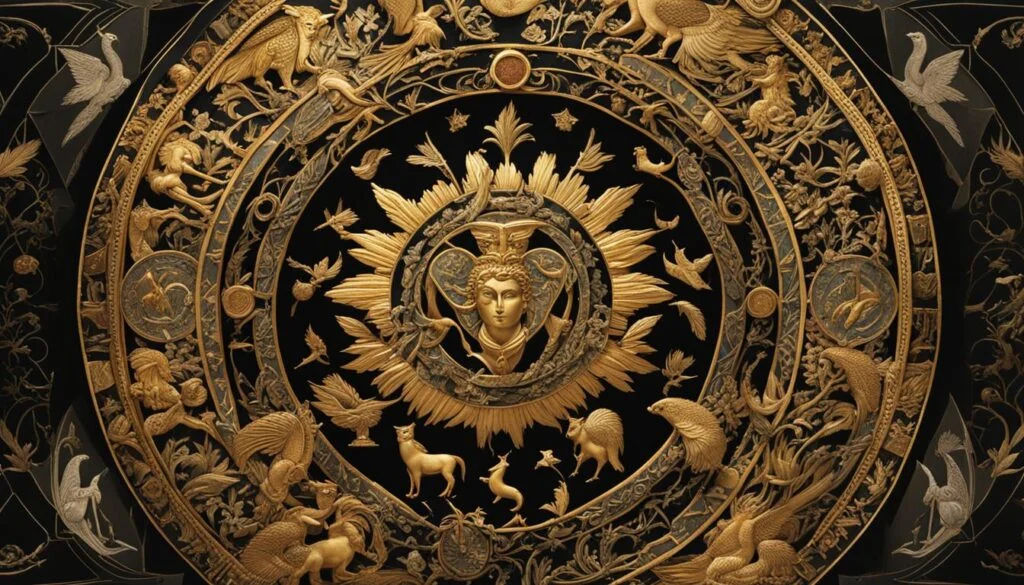
The twelve Olympian gods in Greek mythology each held distinct roles and possessed specific attributes that shaped their significance within ancient Greek culture. Understanding these roles and attributes is essential to gaining insight into the Greek pantheon and its influence on Greek religion and society.
A List of the Twelve Olympian Gods and Their Roles:
- Zeus: King of the gods, ruler of the sky, lightning, and justice.
- Hera: Queen of the gods, goddess of marriage and childbirth.
- Poseidon: God of the sea, earthquakes, and horses.
- Demeter: Goddess of the harvest and fertility.
- Athena: Goddess of wisdom and warfare.
- Apollo: God of the sun, music, and prophecy.
- Artemis: Goddess of the hunt and the moon.
- Ares: God of war.
- Aphrodite: Goddess of love and beauty.
- Hephaestus: God of metalworking and craftsmanship.
- Hermes: Messenger god.
- Dionysus: God of wine and celebration.
These gods played pivotal roles in Greek mythology and were revered by the ancient Greeks for their unique attributes and contributions to various aspects of life.
The Attributes of the Greek Gods:
Each of the twelve Olympian gods also possessed specific attributes that were associated with them. For example:
- Zeus was often depicted with a thunderbolt, symbolizing his power over the sky and lightning.
- Hera was often shown wearing a crown and holding a scepter, signifying her role as queen of the gods.
- Poseidon was commonly depicted with a trident, representing his dominion over the sea.
These attributes and visual representations helped to identify and differentiate each god within the pantheon.
The roles and attributes of the twelve Olympian gods offer a glimpse into the complex and multifaceted nature of Greek mythology. They provide insights into the ancient Greeks’ understanding of the world and their religious beliefs, as well as their values and aspirations.
Other Gods and Goddesses in Greek Mythology
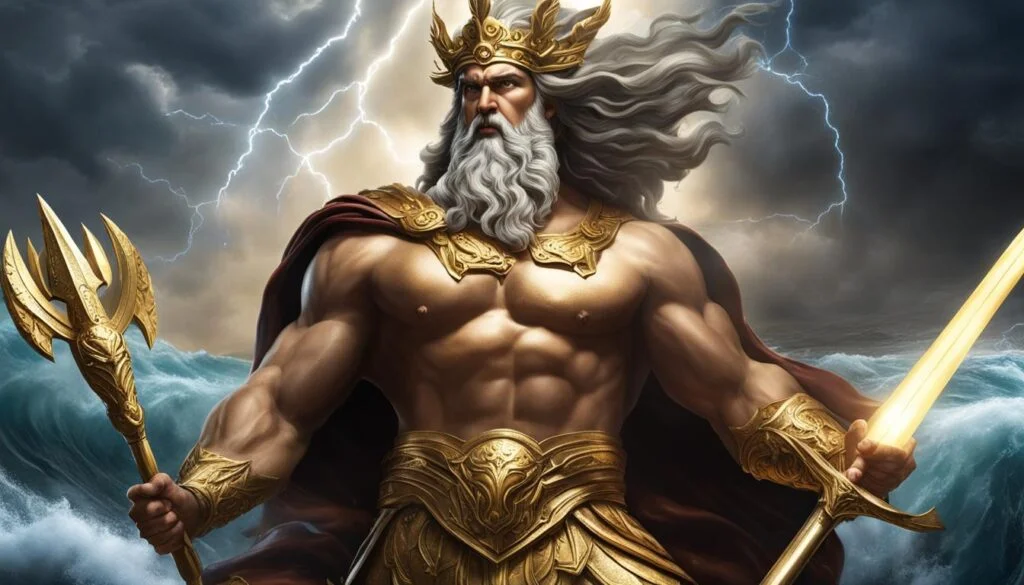
In addition to the twelve Olympian gods, Greek mythology is replete with numerous other gods and goddesses who played prominent roles in Greek religious beliefs and practices. These divine figures, each with their own unique powers and attributes, added depth and richness to the ancient Greek pantheon.
One such noteworthy deity is Hestia, the goddess of hearth and home. She symbolized domesticity and was honored as the guardian of the household flame. Another significant god is Hades, the ruler of the Underworld. As the brother of Zeus and Poseidon, Hades presided over the realm of the dead, while his wife, Persephone, served as the queen of the Underworld.
Hecate, the goddess of magic and witchcraft, was also highly regarded in ancient Greece. She was believed to have the power to bestow blessings or curses, and her influence extended to crossroads, night journeys, and the moon. Pan, the god of the wild and nature, was often depicted with the legs and horns of a goat, symbolizing his close connection to the natural world.
Lastly, Nike, the goddess of victory, held great significance in Greek culture. She was often portrayed as a winged figure, representing triumph and success. Nike was particularly revered in athletic competitions, where her presence was believed to determine the outcome of the games.
Other Prominent Deities in Greek Mythology:
- Demeter – goddess of the harvest and fertility
- Atlas – titan who held up the heavens
- Eos – goddess of the dawn
- Panacea – goddess of healing and remedies
- Chiron – wise centaur known for his teaching and healing abilities
The inclusion of these gods and goddesses in Greek mythology reflects the diverse range of beliefs and ideals held by the ancient Greeks. Their stories, rituals, and representations in art and literature continue to captivate and inspire us today, offering a glimpse into the rich tapestry of Greek culture and religion.
The Significance of Mount Olympus

Mount Olympus holds great significance in Greek mythology as it served as the dwelling place of the gods. According to Greek mythology, Mount Olympus was the highest mountain in mainland Greece and was considered the center of the universe. It was believed to be the home of the twelve Olympian gods and served as a symbol of their power and authority. The gods would convene on Mount Olympus to discuss important matters, making it a sacred and revered location.
In Greek mythology, Mount Olympus represented the divine realm, separate from the mortal world. It was a place where the gods resided, away from the mundane affairs of humans. The mountain itself was depicted as majestic and awe-inspiring, with its peaks often hidden by clouds and surrounded by a divine atmosphere.
The Role of Mount Olympus in Greek Religion and Culture
- Mount Olympus was the focal point of religious worship and rituals dedicated to the gods.
- Pilgrimages to Mount Olympus were undertaken by devout worshippers seeking divine favor or guidance.
- The mountain inspired awe and reverence, symbolizing the power and superiority of the gods over mortals.
- Stories and myths associated with Mount Olympus formed an integral part of Greek literature and oral tradition.
The significance of Mount Olympus in Greek mythology extended beyond religion and permeated various aspects of Greek culture. Artworks, poetry, and literature often depicted the gods on Mount Olympus, reinforcing its importance and immortality. Mount Olympus remains an enduring symbol of the Greek gods and their influence on human imagination and creativity.
Greek Gods in Art and Iconography
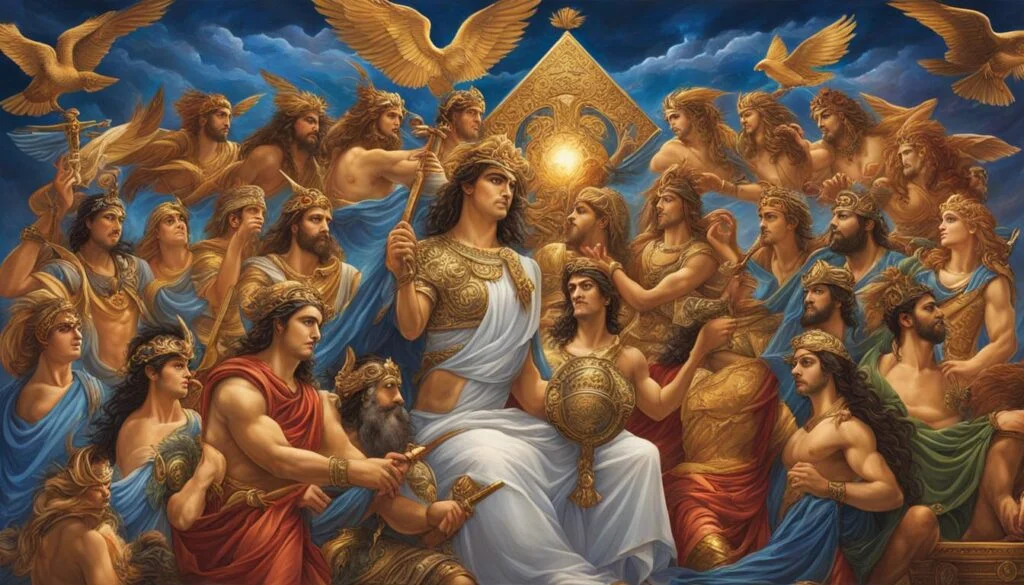
The representation of Greek gods in art played a crucial role in capturing the essence of Greek mythology and shaping the visual identity of these deities. Ancient Greek sculptures and pottery depicted the gods with meticulous attention to detail, conveying their attributes and symbolic significance. These artworks served as a visual language, conveying the myths and stories associated with each god.
One notable example is the representation of Zeus, the king of the gods, often depicted with a thunderbolt in his hand. This iconic symbol, along with his regal pose and powerful physique, conveyed Zeus’ authority and control over the sky and lightning. Similarly, Athena, the goddess of wisdom and warfare, was often portrayed with her helmet and shield, symbolizing her strategic prowess and protection.
The Use of Iconography
In addition to sculptures, Greek gods were also represented through the use of iconography. Each god had specific symbols and attributes that distinguished them from one another. For example, Apollo, the god of the sun, was often depicted with a lyre, representing his association with music. Aphrodite, the goddess of love and beauty, was often portrayed with a mirror, symbolizing her vanity and allure.
By using these consistent symbols and attributes, Greek artists created a visual language that allowed viewers to easily identify and understand the gods depicted in various artworks. This iconography not only served a decorative purpose but also conveyed the myths and stories associated with each god, enabling viewers to connect with the rich tapestry of Greek mythology.
The Enduring Legacy
The representation of Greek gods in art continues to captivate and inspire people today. The intricate details and symbolism in these artworks provide valuable insights into the religious beliefs and cultural values of ancient Greece. They serve as a testament to the enduring influence of Greek mythology on art and storytelling throughout history.
Whether in sculptures, pottery, or other artistic mediums, the representation of Greek gods in art remains an integral part of our understanding and appreciation of Greek mythology.
The Influence of Greek Gods on Society
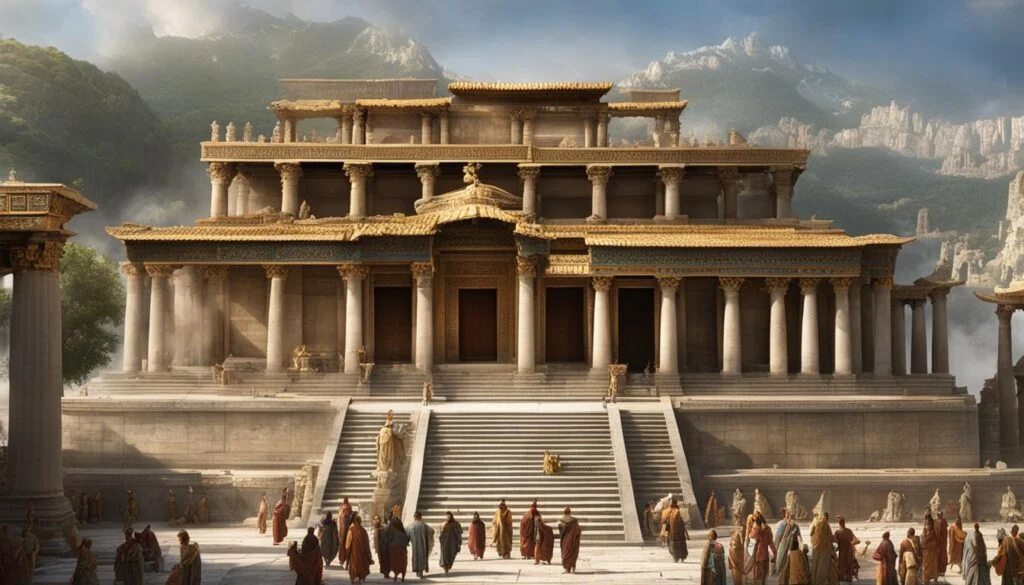
The Greek gods had a significant impact on ancient Greek society, shaping its culture and values in profound ways. These deities were not only revered as religious figures but also served as symbols of cultural ideals and moral principles. The myths and stories surrounding the gods played a central role in shaping the moral and ethical beliefs of the ancient Greeks.
For example, the goddess Athena, known for her wisdom and strategic prowess, influenced the Greek society’s emphasis on knowledge, learning, and intellectual pursuits. This reverence for wisdom was embodied in the establishment of schools, such as Plato’s Academy and Aristotle’s Lyceum, which became renowned centers of philosophical thought.
The cultural significance of the Greek gods extended beyond philosophy and permeated various aspects of society. Their influence can be observed in literature, where the epic poems of Homer, such as the Iliad and the Odyssey, prominently feature the gods and their interactions with mortals. These myths provided a foundation for storytelling and inspired generations of writers and playwrights.
The impact of Greek mythology can also be seen in the arts, where gods and goddesses were depicted in sculptures, paintings, and pottery. These representations not only celebrated the gods but also served as a means of connecting with the divine and expressing religious devotion. The artistic depictions of the Greek gods further contributed to the cultural identity of the ancient Greeks.
The Significance of Temples and Festivals
The influence of the Greek gods can also be seen in the architecture of temples dedicated to their worship. These grand structures, such as the Parthenon dedicated to Athena, served as physical manifestations of the gods’ presence and provided a space for religious rituals and ceremonies. The construction and maintenance of these temples were considered acts of devotion and demonstrated the importance of the gods in Greek society.
Festivals dedicated to specific gods were another integral part of Greek religious and cultural life. These festivals, such as the Olympic Games dedicated to Zeus, brought communities together in celebration and served as opportunities for religious worship, athletic competitions, and artistic performances. The festivals fostered a sense of unity among the Greeks and reinforced their cultural identity.
Legacy and Continuity
The influence of the Greek gods extends far beyond the ancient world and continues to have an impact on modern society. Greek mythology and its gods have inspired countless works of literature, art, and film throughout history. Their stories and archetypal characters have become deeply ingrained in our collective consciousness, shaping our understanding of human nature, love, heroism, and tragedy.
Furthermore, the cultural significance of the Greek gods can be seen in the adoption of their names and attributes in various fields. For example, many scientific terms, constellations, and planets are named after Greek gods and goddesses, reflecting their enduring influence on human knowledge and exploration.
The impact of the Greek gods on society remains undeniable, as their mythology and symbolism continue to captivate our imaginations and shape our cultural landscape. The legacy of these ancient deities serves as a testament to the enduring power of mythology and its ability to shape and influence societies across time.
Conclusion
Throughout Greek mythology, the gods held immense significance in the lives of the ancient Greeks. From the powerful twelve Olympian gods to the countless other deities, their presence and influence permeated every aspect of Greek society. The worship of these gods, the captivating myths and stories that surrounded them, and their representation in art and literature shaped the cultural and religious foundation of ancient Greece. Their legacy continues to captivate and inspire people around the world, making them an enduring part of human history.
The gods of Greek mythology were not only revered as religious figures but also served as symbols of cultural ideals and values. The tales of these gods shaped the moral and ethical beliefs of the ancient Greeks, influencing their daily lives and societal practices. The gods were invoked in various aspects of Greek society, from prayers for blessings to dedicated athletic competitions. Their impact can be seen in the realms of art, literature, philosophy, and even politics.
As we reflect on the gods of Greek mythology, we recognize their profound influence and enduring significance. Their stories have been passed down through generations, offering insight into the ancient Greek civilization and inspiring countless works of art and literature. Whether it is the mighty Zeus with his thunderbolt, Athena with her wisdom and strength, or Aphrodite with her beauty and love, the gods of Greek mythology continue to captivate our imaginations and remind us of the rich cultural legacy they left behind.
FAQ
How many gods are there in Greek mythology?
There are numerous gods in Greek mythology, but the twelve Olympian gods are the most prominent.
What are the origins of Greek gods in mythology?
According to Greek mythology, the gods have a mythical origin, with the first gods being the Primordial Gods.
Who are the twelve Olympian gods?
The twelve Olympian gods are Zeus, Hera, Poseidon, Demeter, Athena, Apollo, Artemis, Ares, Aphrodite, Hephaestus, Hermes, and Dionysus.
How did the ancient Greeks worship their gods?
The ancient Greeks worshipped their gods through rituals, prayers, and votive offerings in sanctuaries located within or near cities.
What were the roles and attributes of the twelve Olympian gods?
Each of the twelve Olympian gods had specific roles and attributes. For example, Zeus was the king of the gods and the god of the sky, lightning, and justice, while Athena was the goddess of wisdom and warfare.
Who are some other important gods and goddesses in Greek mythology?
Other important gods and goddesses in Greek mythology include Hestia, Hades, Persephone, Pan, and Nike.
What is the significance of Mount Olympus in Greek mythology?
Mount Olympus served as the dwelling place of the gods and was considered the center of the universe in Greek mythology.
How were the Greek gods depicted in art?
The Greek gods were often depicted in sculptures and pottery, with each god having specific symbols and attributes that identified them.
What was the influence of Greek gods on ancient Greek society?
The Greek gods played a significant role in ancient Greek society, shaping moral and ethical beliefs, influencing art and literature, and being invoked in daily life.
Conclusion
The gods of Greek mythology were an integral part of Greek culture and religion, with their worship, myths, and influence impacting various aspects of ancient Greek society.


